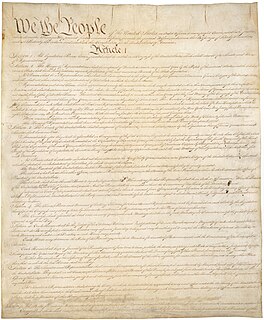Federalism is a mixed or compound mode of government that combines a general government with regional governments in a single political system, dividing the powers between the two. Federalism in the modern era was first adopted in the unions of states during the Old Swiss Confederacy.

The Constitution of the United States is the supreme law of the United States of America. It superseded the Articles of Confederation, the nation's first constitution. Originally comprising seven articles, it delineates the national frame of government. Its first three articles embody the doctrine of the separation of powers, whereby the federal government is divided into three branches: the legislative, consisting of the bicameral Congress ; the executive, consisting of the president and subordinate officers ; and the judicial, consisting of the Supreme Court and other federal courts. Article IV, Article V and Article VI embody concepts of federalism, describing the rights and responsibilities of state governments, the states in relationship to the federal government, and the shared process of constitutional amendment. Article VII establishes the procedure subsequently used by the 13 States to ratify it. It is regarded as the oldest written and codified national constitution in force.

Article Five of the United States Constitution describes the process for altering the Constitution. Under Article Five, the process to alter the Constitution consists of proposing an amendment or amendments, and subsequent ratification.

The Seventeenth Amendment to the United States Constitution established the direct election of United States senators in each state. The amendment supersedes Article I, §3, Clauses 1 and 2 of the Constitution, under which senators were elected by state legislatures. It also alters the procedure for filling vacancies in the Senate, allowing for state legislatures to permit their governors to make temporary appointments until a special election can be held.

The Basic Law for the Federal Republic of Germany is the constitution of the Federal Republic of Germany.

In political science, an initiative is a means by which a petition signed by a certain number of registered voters can force a government to choose either to enact a law or hold a public vote in the legislature in what is called indirect initiative, or under direct initiative, where the proposition is put to a plebiscite or referendum, in what is called a Popular initiated Referendum or citizen-initiated referendum.
A constitutional amendment is a modification of the constitution of a polity, organization or other type of entity. Amendments are often interwoven into the relevant sections of an existing constitution, directly altering the text. Conversely, they can be appended to the constitution as supplemental additions, thus changing the frame of government without altering the existing text of the document.

A constituent assembly is a body assembled for the purpose of drafting or revising a constitution. Members of a constituent assembly may be elected by popular vote, drawn by sortition, appointed, or some combination of these methods. Assemblies are typically considered distinct from a regular legislature, although members of the legislature may compose a significant number of its members. As the fundamental document constituting a state, a constitution cannot normally be modified or amended by the state's normal legislative procedures; instead a constitutional convention or a constituent assembly, the rules for which are normally laid down in the constitution, must be set up. A constituent assembly is usually set up for its specific purpose, which it carries out in a relatively short time, after which the assembly is dissolved. A constituent assembly is a form of representative democracy.

The United States Constitution has served as the supreme law of the United States since taking effect in 1789. The document was written at the 1787 Philadelphia Convention and was ratified through a series of state conventions held in 1787 and 1788. Since 1789, the Constitution has been amended twenty-seven times; particularly important amendments include the ten amendments of the United States Bill of Rights and the three Reconstruction Amendments.

The Constitution of Austria is the body of all constitutional law of the Republic of Austria on the federal level. It is split up over many different acts. Its centerpiece is the Federal Constitutional Law (Bundes-Verfassungsgesetz) (B-VG), which includes the most important federal constitutional provisions.

The Constitutional Convention took place in Philadelphia from May 25 to September 17, 1787. Although the convention was intended to revise the league of states and first system of government under the Articles of Confederation, the intention from the outset of many of its proponents, chief among them James Madison of Virginia and Alexander Hamilton of New York, was to create a new Frame of Government rather than fix the existing one. The delegates elected George Washington of Virginia, former commanding general of the Continental Army in the late American Revolutionary War (1775–1783) and proponent of a stronger national government, to become President of the convention. The result of the convention was the creation of the Constitution of the United States, placing the Convention among the most significant events in American history.
Constitutional convention may refer to:
A convention to propose amendments to the United States Constitution, also referred to as an Article V Conventionor amendatory convention; is one of two methods authorized by Article Five of the United States Constitution whereby the United States Constitution may be altered. Amendments may also be proposed by Congress with a two-thirds vote in both the House of Representatives and the Senate.
The Constitution of the Argentine Nation is the basic governing document of Argentina, and the primary source of existing law in Argentina. Its first version was written in 1853 by a constitutional assembly which gathered in Santa Fe; the doctrinal basis was taken in part from the United States Constitution. It was then reformed in 1860, 1866, 1898, 1949, 1957, and the current version is the reformed text of 1994.

The Virginia Conventions have been the assemblies of delegates elected for the purpose of establishing constitutions of fundamental law for the Commonwealth of Virginia superior to General Assembly legislation. Their constitutions and subsequent amendments span four centuries across the territory of modern-day Virginia, West Virginia and Kentucky.

A convention, in the sense of a meeting, is a gathering of individuals who meet at an arranged place and time in order to discuss or engage in some common interest. The most common conventions are based upon industry, profession, and fandom. Trade conventions typically focus on a particular industry or industry segment, and feature keynote speakers, vendor displays, and other information and activities of interest to the event organizers and attendees. Professional conventions focus on issues of concern along with advancements related to the profession. Such conventions are generally organized by societies or communities dedicated to promotion of the topic of interest. Fan conventions usually feature displays, shows, and sales based on pop culture and guest celebrities. Science fiction conventions traditionally partake of the nature of both professional conventions and fan conventions, with the balance varying from one to another. Conventions also exist for various hobbies, such as gaming or model railroads.
Constitutional reform in the Philippines, also known as charter change, refers to the political and legal processes needed to amend the current 1987 Constitution of the Philippines. Under the common interpretation of the Constitution, amendments can be proposed by one of three methods: a People's Initiative, a Constituent Assembly or a Constitutional Convention.
The calling of a Second Constitutional Convention of the United States is a proposal made by some scholars and activists from across the political spectrum for the purpose of making substantive reforms to the United States federal government by rewriting its Constitution.

Wolf-PAC is an American nonpartisan political action committee formed in 2011 with the goal of adding an "amendment to the United States Constitution to ensure balance, integrity, and transparency to our national system of campaign finance".
A campaign finance reform amendment refers to any proposed amendment to the United States Constitution to authorize greater restrictions on spending related to political speech, and to overturn Supreme Court rulings which have narrowed such laws under the First Amendment. Several amendments have been filed since Citizens United v. Federal Election Commission and the Occupy movement.








